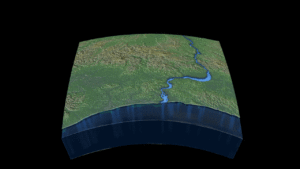 WOODS HOLE – Researchers with the Woods Hole Oceanographic Institution say that river outflow might play a role in sea level change.
WOODS HOLE – Researchers with the Woods Hole Oceanographic Institution say that river outflow might play a role in sea level change.
A WHOI study explored decades of tidal and river level data from across the eastern United States. The researchers used that data along with information on water density, salinity, and the Earth’s rotation to create a model that looks at the link between river discharge and sea level on a yearly basis.
“The equation we derived lets us predict how much sea level will rise based on river flow, and then compare that prediction to actual measurements and observations,” says Chris Piecuch, a physical oceanographer at WHOI and lead author on the paper. “Based on our model and the observations, we’re finding that variations in the amount of water that comes out of a river annually can raise or lower coastal mean sea level by several centimeters.”
Researchers found the majority of this sea level change occurs on just one side of the mouth of a river. WHOI scientists say since freshwater is less dense than saltwater, the outflow from a river floats along the surface of the ocean. That freshwater forms a current that raises sea levels along shorelines since the water is pushing up against the shore.
Piecuch said the research could help future calculations on the effects of sea level rise on coastal regions.
“When you think of societal impact, you want to know what’s happening at the coast,” Piecuch says. “In low lying areas like Bangladesh, we don’t yet know how sea level and river outflow combine. But if a major storm comes through, even a small rise in the background mean sea level could have a huge impact on flooding.”
























